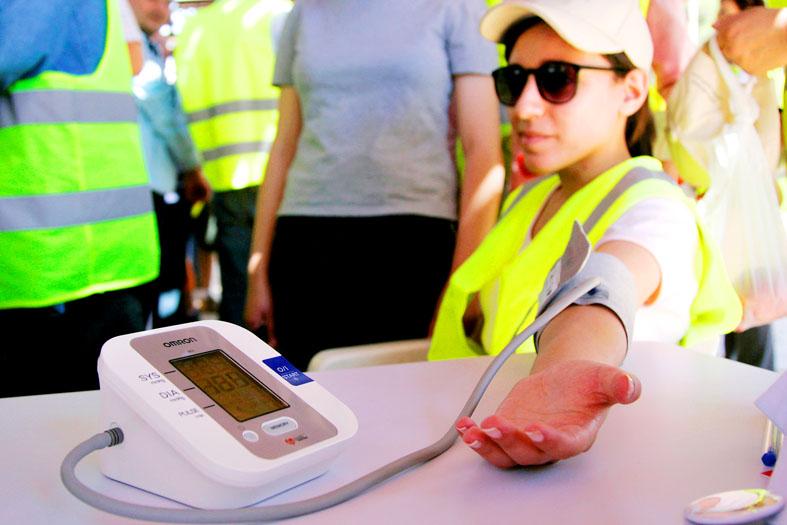The number of people living with high blood pressure has more than doubled since 1990, said a major study published yesterday, which found that half of all sufferers — about 720 million people — went untreated in 2019.
Hypertension is linked to more than 8.5 million deaths each year, and is the leading risk factor for strokes, and heart and liver disease.
To find out how hypertension rates have developed globally over the past 30 years, an international team from Non-Communicable Disease Risk Factor Collaboration analyzed data from more than 1,200 national studies covering nearly every country in the world. They used modeling to estimate high blood pressure rates across populations, as well as the number of people taking medication for the condition.

Photo: Reuters
The study found that in 2019 there were 626 million women and 652 million men living with hypertension.
That represented about double the estimated 331 million women and 317 million men with the condition in 1990.
Forty-one percent of women and 51 percent of men with high blood pressure were unaware of their condition, meaning hundreds of millions of people were missing out on effective treatment, the study found.
“Despite medical and pharmacological advances over decades, global progress in hypertension management has been slow, and the vast majority of people with hypertension remain untreated,” said Majid Ezzati, a professor at Imperial College London’s School of Public Health and senior study author.
In the study, published in The Lancet medical journal, Canada and Peru had the lowest proportion of high blood pressure among adults in 2019, with about one in four people living with the condition.
Taiwan, Japan, South Korea, Spain, Switzerland and the UK had the lowest hypertension rates in women at less than 24 percent, while Bangladesh, Eritrea, Ethiopia and the Solomon Islands had the lowest rates in men at less than 25 percent.
At the other end of the spectrum, more than half of women in Paraguay and Tuvalu had hypertension; more than half of men in Argentina, Paraguay and Tajikistan also have the condition, the study showed.
Robert Storey, professor of cardiology at the University of Sheffield, said that COVID-19 had distracted governments from hypertension.
“The pandemic of cardiovascular disease has received less attention in the last 18 months, but reflects concerning worldwide trends in unhealthy lifestyle choices such as high fat, sugar, salt and alcohol intake, sedentary lifestyles with avoidance of exercise and smoking,” said Storey, who was not involved in the study. “It is essential that best practice in government policy is adopted by all countries in order to avoid a time bomb of heart disease and stroke.”

South Korea would soon no longer be one of the few countries where Google Maps does not work properly, after its security-conscious government reversed a two-decade stance to approve the export of high-precision map data to overseas servers. The approval was made “on the condition that strict security requirements are met,” the South Korean Ministry of Land, Infrastructure and Transport said. Those conditions include blurring military and other sensitive security-related facilities, as well as restricting longitude and latitude coordinates for South Korean territory on products such as Google Maps and Google Earth, it said. The decision is expected to hurt Naver and Kakao

THE TRAGEDY OF PUNCH: Footage of the seven-month-old Japanese macaque has gone viral online after he was rejected by his mother and formed a bond with a soft toy A baby monkey in Japan has captured hearts around the world after videos of him being bullied by other monkeys and rejected by his mother went viral last week. Punch, a Japanese macaque, was born in July last year at Ichikawa City Zoo. He has drawn international attention after zookeepers gave him a stuffed orangutan toy after he was abandoned by his mother. Without maternal guidance to help him integrate, Punch has turned to the toy for comfort. He has been filmed multiple times being dragged and chased by older Japanese macaques inside the enclosure. Early clips showed him wandering alone with

MONEY GRAB: People were rushing to collect bills scattered on the ground after the plane transporting money crashed, which an official said hindered rescue efforts A cargo plane carrying money on Friday crashed near Bolivia’s capital, damaging about a dozen vehicles on highway, scattering bills on the ground and leaving at least 15 people dead and others injured, an official said. Bolivian Minister of Defense Marcelo Salinas said the Hercules C-130 plane was transporting newly printed Bolivian currency when it “landed and veered off the runway” at an airport in El Alto, a city adjacent to La Paz, before ending up in a nearby field. Firefighters managed to put out the flames that engulfed the aircraft. Fire chief Pavel Tovar said at least 15 people died, but

Australian Prime Minister Anthony Albanese yesterday said he did not take his security for granted, after he was evacuated from his residence for several hours following a bomb threat sent to a Chinese dance group. Albanese was evacuated from his Canberra residence late on Tuesday following the threat, and returned a few hours later after nothing suspicious was found. The bomb scare was among several e-mails threatening Albanese sent to a representative of Shen Yun, a classical Chinese dance troupe banned in China that is due to perform in Australia this month, a spokesperson for the group said in a statement. The e-mail